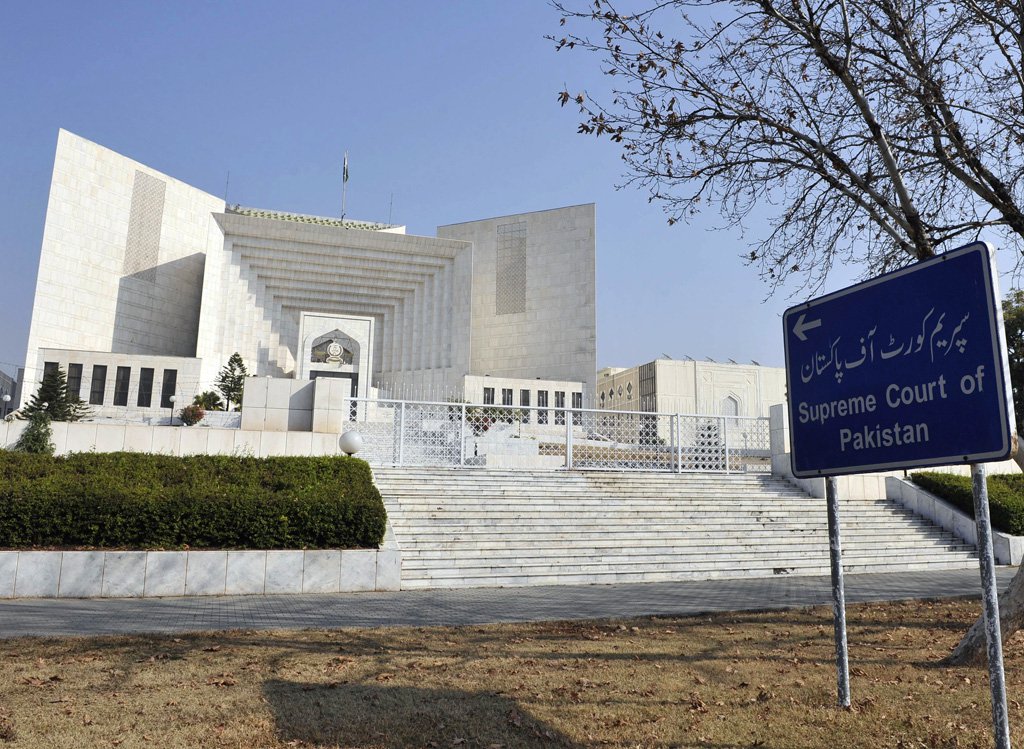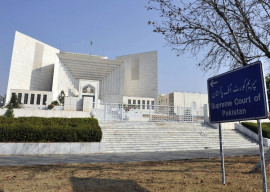
The Supreme Court has urged the courts and prosecution departments to release the convict on probation by incorporating unpaid community service as part of the conditions of the order.
The order that the top court was referring to is the Probation of Offenders Ordinance, 1960.
"The prosecution, and the courts, keeping in view the nature of the offence and provided the Ordinance permits, should consider the request of a convict volunteering to do unpaid community service, and if appropriate, release the convict on probation by incorporating unpaid community service as part of the conditions of the probation order,”read a seven-page judgment authored by Justice Qazi Faez Isa while releasing a young man on probation who was found guilty in an offence under section 489-F of the Pakistan Penal Code, 1860 as a cheque of over Rs1 million issued by him was dishonoured.
The appellate court had upheld the conviction but reduced his substantive sentence to one-year rigorous imprisonment while maintaining the fine and the punishment in default of payment of the fine.
The Lahore High Court had maintained the decision of the appellate court.
Read more: Elevation of Judges to the Supreme Court of Pakistan: seniority issue
A division bench of the apex court led by Justice Isa heard the matter.
The counsel for the petitioner requested the bench to release his client on probation under the Probation of Offenders Ordinance, 1960.
The judgment noted that a probation order, which mandated community service, benefitted the offender, community and State, as it saved the expense of keeping a convict imprisoned, and it also prevented the overcrowding of prisons.
“The convict’s family unit is also not disrupted, and he may also retain his employment, and if he is studying continue to do so. It is less damaging to self-esteem and prevents exposure to undesirable elements in jail,” the verdict added.
The judgment read that by doing community service, the convict paid back to society for his wrongdoing and it might also develop in the convict a sense of social responsibility and a sense of personal achievement.
“What attracts us is the opportunity which the community service order would give for constructive activity in the form of personal service to the community, and the possibility of a changed outlook on the part of the offender" the verdict read.
Justice Isa, however, noted that a recourse to the ordinance was rarely made by the prosecution, defence, or courts, despite it subsisting for 62 years.
"One reason could be that it was not envisaged that a convict could be made to do unpaid community service. But, (as noted by us above) the Ordinance does not exclude incorporating unpaid community service into a probation order.
The judge observed that the stated object of the Ordinance was to rehabilitate a convict as an honest, industrious, and law-abiding citizen -- which might well be achieved by community service"
Justice Isa also noted that in some countries, a probation order is referred to as a community service order.
"An acclaimed academic noted the positive aspects of a community service order [including] restricting [the] growth of prison numbers,; reducing prison expenditure,; enabling offenders to ‘pay back’ for their wrongdoing; does not target the families of offenders; helps combat experience of alienation in offenders by providing them with an opportunity to perform constructive work in the community; promoting social integration by enabling offenders to associate with volunteers and the recipients of their assistance; [and] reparation by offenders in an atmosphere of cooperation with the community and not in confrontation with authority,” the judgment read.
“Reparation has an intrinsic moral value of its own, and on another view, reparation finds its greatest justification in ensuring that the offender does not enjoy the fruits of his crime and provides offenders with the opportunity to participate in society and to develop a sense of social responsibility; undertake constructive work in the community; and provides a cheap humane way of rehabilitation; contains an element of ‘bite’; and is flexible,” it added.
The verdict read that another positive revealed by a study was that there was a “significant reduction in the rates of reoffending’ or recidivism".
The judgment stated that the first recorded use of what may be akin to a community service order was by Holy Prophet Muhammad (peace be upon him) when after the Battle of Badr, a prisoner could earn his freedom by teaching 10 Muslims to read and write.
“A renowned Muslim jurist uses the phrase fida’ bil ‘amal with regard to the Battle of Badr prisoners who had secured their release on teaching, which would translate as, securing release on account of your deeds. This may also constitute futuwwah,” the verdict read.
"Futuwwah in Islam is the spiritual ethical concept of chivalry, mercy, altruism, and generosity. It is stated to be derived from the noted character of Holy Prophet Muhammad (peace be upon him) as mentioned in the Holy Quran, that he possessed a magnificent character,” it added.
The judge observed that a probation order, which includes rendering of community service, might also operate as fida’ bil ‘amal. He added that Islamic Shariah, which included analogous precedents from Islamic jurisprudence, was a legally acceptable method of statutory interpretation.
The judgment noted it had been stated on behalf of the petitioner that he had agreed not to commit any crime during the duration of his probation; had agreed to pay an amount of Rs45,000 (equivalent to the amount of fine) to the complainant; and had agreed to remain on probation for a period of one year doing unpaid community service of 100 hours by the work assigned to him by the Parks and Horticulture Authority, Rawalpindi, under the supervision of the probation officer, Rawalpindi.
“The petitioner shall be released on probation subject to his furnishing a personal bond,” it added.
The order read that the judge of the trial court shall order the release of the petitioner on probation upon him submitting the bond, incorporating the noted terms, in the sum of Rs50 000 with one surety in the same amount.
"However, if the petitioner fails to observe any of the conditions of his bond. the court may issue summons or warrant of his arrest, and, if after hearing the petitioner, the court is satisfied that he has failed to observe any of the conditions of his bond, the court may sentence him by restoring his original sentence and if the petitioner fails to pay the said compensation, he shall be dealt with in terms of section 6(3) of the Ordinance,” it added.

1725612926-0/Tribune-Pic-(8)1725612926-0-165x106.webp)








1725254039-0/Untitled-design-(24)1725254039-0-270x192.webp)









COMMENTS
Comments are moderated and generally will be posted if they are on-topic and not abusive.
For more information, please see our Comments FAQ